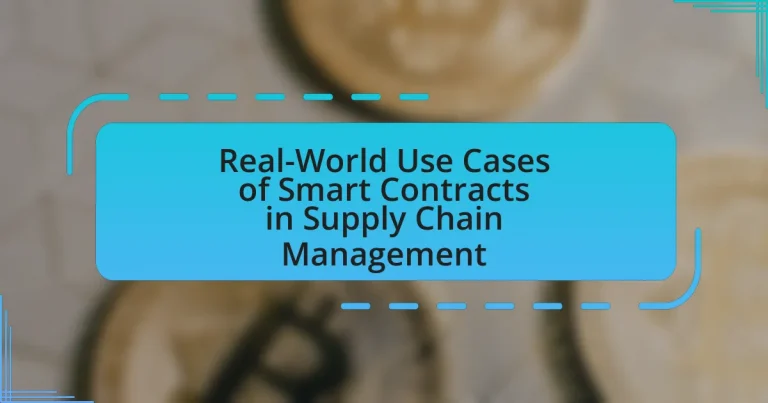Smart contracts are self-executing agreements with terms encoded in software, playing a crucial role in enhancing supply chain management through automation, transparency, and efficiency. This article explores the real-world applications of smart contracts in supply chains, highlighting their ability to streamline processes such as order fulfillment, payment processing, and compliance verification. Key features include improved traceability, reduced operational costs, and enhanced trust among stakeholders, while addressing challenges faced by traditional supply chains, such as inefficiencies and lack of transparency. The discussion also covers successful implementations across various industries, the integration of emerging technologies like AI and IoT, and best practices for effective deployment.
What are Smart Contracts and Their Role in Supply Chain Management?
Smart contracts are self-executing contracts with the terms of the agreement directly written into code, enabling automated and trustless transactions. In supply chain management, smart contracts facilitate transparency, efficiency, and traceability by automating processes such as order fulfillment, payment processing, and compliance verification. For instance, when goods are delivered, a smart contract can automatically trigger payment to the supplier, reducing delays and minimizing disputes. According to a report by the World Economic Forum, the implementation of smart contracts in supply chains can lead to a 20% reduction in operational costs, highlighting their significant impact on improving supply chain efficiency.
How do Smart Contracts function within Supply Chains?
Smart contracts function within supply chains by automating and enforcing agreements between parties without the need for intermediaries. They execute predefined actions when specific conditions are met, such as releasing payments upon delivery confirmation or triggering inventory restocking when levels fall below a threshold. This automation enhances efficiency, reduces errors, and increases transparency in transactions. For instance, a study by Accenture found that implementing blockchain and smart contracts in supply chains could reduce administrative costs by up to 30%, demonstrating their potential to streamline operations and improve trust among stakeholders.
What are the key features of Smart Contracts in this context?
The key features of Smart Contracts in the context of Supply Chain Management include automation, transparency, security, and efficiency. Automation allows for self-executing agreements that trigger actions based on predefined conditions, reducing the need for intermediaries. Transparency ensures that all parties have access to the same information, enhancing trust and accountability throughout the supply chain. Security is provided through cryptographic techniques that protect data integrity and prevent unauthorized access. Efficiency is achieved by streamlining processes, reducing delays, and minimizing errors, which ultimately leads to cost savings and improved operational performance. These features collectively enhance the effectiveness of supply chain operations, as evidenced by successful implementations in various industries, such as food safety tracking and logistics management.
How do Smart Contracts ensure transparency and trust?
Smart contracts ensure transparency and trust by automating and recording transactions on a blockchain, which is an immutable ledger. This technology allows all parties involved in a transaction to access the same information in real-time, eliminating discrepancies and the need for intermediaries. For instance, in supply chain management, smart contracts can automatically execute payments when goods are delivered, ensuring that all stakeholders can verify the transaction’s completion without relying on a central authority. The transparency of the blockchain means that once a smart contract is deployed, its terms cannot be altered, providing a reliable framework for trust among participants.
What challenges do traditional supply chains face that Smart Contracts can address?
Traditional supply chains face challenges such as lack of transparency, inefficiencies in contract execution, and susceptibility to fraud, which Smart Contracts can effectively address. Smart Contracts automate and enforce agreements through blockchain technology, ensuring that all parties have access to the same information in real-time, thereby enhancing transparency. Additionally, they eliminate the need for intermediaries, reducing delays and costs associated with contract execution. According to a report by the World Economic Forum, implementing blockchain technology in supply chains can reduce administrative costs by up to 30%, demonstrating the potential for Smart Contracts to mitigate inefficiencies and fraud in traditional supply chains.
How do inefficiencies in traditional supply chains impact businesses?
Inefficiencies in traditional supply chains significantly impact businesses by increasing operational costs and reducing overall productivity. These inefficiencies often stem from outdated processes, lack of real-time data, and poor communication among stakeholders, leading to delays in delivery and inventory management. For instance, a study by the World Economic Forum indicates that supply chain inefficiencies can cost businesses up to 20% of their revenue due to lost sales and excess inventory. Additionally, these inefficiencies can result in decreased customer satisfaction, as delays and inaccuracies in order fulfillment directly affect the customer experience.
What risks are associated with traditional supply chain processes?
Traditional supply chain processes are associated with several risks, including inefficiencies, lack of transparency, and vulnerability to disruptions. Inefficiencies arise from manual processes and outdated technology, leading to delays and increased costs. Lack of transparency can result in difficulties in tracking products and verifying their authenticity, which may lead to fraud or quality issues. Vulnerability to disruptions is evident in reliance on single suppliers or geographic regions, making the supply chain susceptible to natural disasters, political instability, or economic fluctuations. These risks highlight the need for more robust solutions, such as smart contracts, to enhance efficiency, transparency, and resilience in supply chain management.
What are Real-World Use Cases of Smart Contracts in Supply Chain Management?
Real-world use cases of smart contracts in supply chain management include automating procurement processes, ensuring product authenticity, and enhancing traceability. For instance, companies like IBM and Maersk utilize smart contracts to streamline shipping logistics, reducing paperwork and minimizing delays. Additionally, smart contracts can verify the origin of goods, as seen in the diamond industry, where Everledger employs blockchain technology to track the provenance of diamonds, ensuring ethical sourcing. These applications demonstrate how smart contracts improve efficiency, transparency, and trust within supply chains.
How are companies implementing Smart Contracts in their supply chains?
Companies are implementing smart contracts in their supply chains by automating processes such as procurement, inventory management, and payment settlements. For instance, companies like IBM and Maersk utilize blockchain technology to create smart contracts that automatically execute transactions when predefined conditions are met, enhancing transparency and reducing delays. This implementation allows for real-time tracking of goods and ensures that payments are released only when delivery is confirmed, thereby minimizing disputes and increasing efficiency.
What industries are leading the way in Smart Contract adoption?
The industries leading the way in Smart Contract adoption include finance, supply chain management, healthcare, and real estate. In finance, Smart Contracts facilitate automated transactions and compliance, enhancing efficiency and reducing costs. In supply chain management, they provide transparency and traceability, allowing stakeholders to track goods in real-time. Healthcare utilizes Smart Contracts for secure patient data sharing and streamlined billing processes. Real estate benefits from Smart Contracts by simplifying property transactions and ensuring secure ownership transfers. These industries demonstrate significant advancements in operational efficiency and trust through Smart Contract implementation.
What specific examples illustrate successful Smart Contract applications?
Successful Smart Contract applications include the use of IBM’s Food Trust blockchain, which enhances transparency and traceability in the food supply chain. This system allows stakeholders to track the journey of food products from farm to table, reducing waste and improving safety. Another example is De Beers’ Tracr platform, which utilizes Smart Contracts to verify the provenance of diamonds, ensuring ethical sourcing and reducing fraud. Additionally, the VeChain platform has been implemented by companies like Walmart China to streamline supply chain processes, enabling real-time tracking of products and automating compliance checks. These examples demonstrate the effectiveness of Smart Contracts in improving efficiency, transparency, and trust in supply chain management.
What benefits have companies experienced from using Smart Contracts?
Companies have experienced increased efficiency and reduced costs from using smart contracts. By automating processes and eliminating intermediaries, smart contracts streamline transactions, which leads to faster execution and lower operational expenses. For instance, a study by IBM and Maersk highlighted that the use of blockchain and smart contracts in supply chain management can reduce administrative costs by up to 30%. Additionally, smart contracts enhance transparency and trust among parties, as all transactions are recorded on a tamper-proof ledger, reducing disputes and fostering collaboration.
How do Smart Contracts improve efficiency and reduce costs?
Smart contracts improve efficiency and reduce costs by automating processes and eliminating intermediaries in transactions. This automation streamlines operations, reduces the time required for contract execution, and minimizes human error. For instance, in supply chain management, smart contracts can automatically trigger payments and updates based on predefined conditions, such as the delivery of goods, which accelerates the overall process. According to a report by the World Economic Forum, the implementation of blockchain and smart contracts in supply chains can reduce administrative costs by up to 30%. This reduction in costs is primarily due to decreased reliance on manual processes and the associated labor expenses.
What impact do Smart Contracts have on compliance and regulatory issues?
Smart contracts significantly enhance compliance and regulatory adherence by automating and enforcing contractual obligations in a transparent manner. They operate on blockchain technology, which provides an immutable record of transactions, ensuring that all parties involved can verify compliance in real-time. This transparency reduces the risk of fraud and errors, as all actions taken under the contract are recorded and accessible.
For instance, in supply chain management, smart contracts can automatically execute payments and trigger actions based on predefined conditions, such as delivery confirmations or quality checks. This automation not only streamlines processes but also ensures that all regulatory requirements are met without manual intervention. According to a report by the World Economic Forum, the use of smart contracts in supply chains can reduce compliance costs by up to 30%, demonstrating their effectiveness in addressing regulatory issues.
What are the Future Trends of Smart Contracts in Supply Chain Management?
The future trends of smart contracts in supply chain management include increased automation, enhanced transparency, and improved security. Automation will streamline processes by enabling real-time execution of contracts based on predefined conditions, reducing the need for intermediaries. Enhanced transparency will arise from the immutable nature of blockchain technology, allowing all parties to access the same information, thereby minimizing disputes and fostering trust. Improved security will be achieved through cryptographic techniques that protect data integrity and prevent unauthorized access. According to a report by Deloitte, 40% of supply chain executives believe that blockchain will be a critical part of their operations in the next five years, highlighting the growing recognition of smart contracts as a transformative tool in supply chain management.
How is technology evolving to enhance Smart Contracts in supply chains?
Technology is evolving to enhance Smart Contracts in supply chains through advancements in blockchain, artificial intelligence, and the Internet of Things (IoT). Blockchain technology provides a decentralized and immutable ledger that ensures transparency and security in transactions, which is crucial for the trust required in supply chain operations. For instance, companies like IBM and Maersk have implemented blockchain solutions to track shipments in real-time, reducing disputes and improving efficiency.
Artificial intelligence is being integrated to automate contract execution and optimize decision-making processes. AI algorithms analyze data from various sources to predict supply chain disruptions and trigger smart contracts automatically, ensuring timely responses. For example, AI-driven platforms can assess weather conditions or market trends to adjust contract terms dynamically.
The Internet of Things enhances Smart Contracts by enabling real-time data collection from connected devices. Sensors can monitor conditions such as temperature and humidity during transportation, automatically executing contract clauses if predefined thresholds are breached. This integration minimizes risks and ensures compliance with contractual obligations, as seen in the food and pharmaceutical industries where product integrity is critical.
Overall, these technological advancements collectively improve the reliability, efficiency, and adaptability of Smart Contracts in supply chains.
What role does blockchain play in the future of Smart Contracts?
Blockchain serves as the foundational technology for the future of smart contracts by providing a decentralized, immutable ledger that enhances security and trust. This technology enables smart contracts to execute automatically when predefined conditions are met, reducing the need for intermediaries and minimizing the risk of fraud. The transparency and traceability offered by blockchain ensure that all parties involved in a transaction can verify the contract’s execution, which is particularly beneficial in supply chain management where accountability is crucial. According to a report by the World Economic Forum, blockchain could help reduce supply chain costs by up to 20% by streamlining processes and improving data accuracy.
How might AI and IoT integrate with Smart Contracts in supply chains?
AI and IoT can integrate with Smart Contracts in supply chains by automating data collection and decision-making processes. AI algorithms analyze real-time data from IoT devices, such as sensors and RFID tags, to monitor inventory levels, track shipments, and assess product conditions. This data can trigger Smart Contracts to execute predefined actions, such as releasing payments or initiating restocking when certain conditions are met. For instance, if an IoT sensor detects that a shipment has arrived at a warehouse, the Smart Contract can automatically release payment to the supplier, ensuring efficiency and reducing the risk of fraud. This integration enhances transparency, reduces delays, and improves overall supply chain management.
What are the potential challenges and limitations of Smart Contracts?
Smart contracts face several potential challenges and limitations, including legal enforceability, coding errors, and scalability issues. Legal enforceability is a significant concern, as the legal status of smart contracts varies by jurisdiction, which can complicate their use in supply chain management. Coding errors can lead to unintended consequences, as smart contracts are immutable once deployed, meaning that any bugs or vulnerabilities can be exploited. Scalability issues arise from the limitations of blockchain technology, where transaction speeds and costs can hinder the efficiency of smart contracts in high-volume supply chains. These challenges highlight the need for careful consideration and robust testing before implementing smart contracts in real-world applications.
What legal and regulatory hurdles do Smart Contracts face?
Smart contracts face significant legal and regulatory hurdles, primarily due to their lack of legal recognition in many jurisdictions. Many legal systems do not explicitly acknowledge smart contracts as enforceable agreements, leading to uncertainty in their applicability. Additionally, issues related to jurisdiction arise, as smart contracts operate on decentralized networks that may span multiple legal territories, complicating enforcement and compliance with local laws. Furthermore, regulatory concerns regarding data privacy, consumer protection, and anti-money laundering laws can hinder the adoption of smart contracts in supply chain management. For instance, the European Union’s General Data Protection Regulation (GDPR) imposes strict rules on data handling that may conflict with the immutable nature of blockchain technology used in smart contracts.
How can companies mitigate risks associated with Smart Contracts?
Companies can mitigate risks associated with smart contracts by implementing thorough code audits and employing legal frameworks. Conducting comprehensive code audits ensures that the smart contract is free from vulnerabilities and errors, which can lead to financial losses or operational failures. According to a report by ConsenSys, 70% of smart contracts contain bugs, highlighting the necessity for rigorous testing and validation processes. Additionally, integrating legal frameworks can provide clarity on the enforceability of smart contracts, ensuring that all parties understand their rights and obligations. This dual approach of technical scrutiny and legal alignment significantly reduces the potential for disputes and enhances the reliability of smart contracts in supply chain management.
What best practices should companies follow when implementing Smart Contracts?
Companies should follow several best practices when implementing Smart Contracts to ensure efficiency and security. First, they must conduct thorough legal reviews to ensure compliance with existing regulations, as Smart Contracts can have legal implications depending on jurisdiction. Second, companies should engage in comprehensive testing of the Smart Contracts in a controlled environment to identify and rectify potential vulnerabilities before deployment. Third, they should ensure clear and precise coding to minimize errors, as even minor mistakes can lead to significant financial losses or operational disruptions. Additionally, companies should establish a robust governance framework that includes monitoring and auditing mechanisms to oversee Smart Contract performance and compliance. Finally, fostering collaboration among stakeholders is essential to ensure that all parties understand the terms and conditions encoded in the Smart Contracts, which can enhance trust and reduce disputes. These practices are supported by industry reports indicating that proper implementation can significantly reduce transaction costs and improve operational efficiency in supply chain management.
How can organizations ensure successful integration of Smart Contracts?
Organizations can ensure successful integration of Smart Contracts by establishing clear objectives and aligning them with business processes. This involves identifying specific use cases where Smart Contracts can add value, such as automating transactions and enhancing transparency in supply chain management.
Additionally, organizations should invest in training and educating their teams about blockchain technology and Smart Contracts to foster a culture of innovation. Collaborating with technology partners who specialize in blockchain solutions can also facilitate smoother integration.
Furthermore, conducting thorough testing and pilot programs before full-scale implementation helps identify potential issues and refine the Smart Contract functionalities. According to a report by Deloitte, 39% of organizations that have adopted blockchain technology cite the importance of pilot programs in their integration strategy, highlighting the effectiveness of this approach.
What common pitfalls should companies avoid in Smart Contract deployment?
Companies should avoid inadequate testing and auditing of smart contracts during deployment. Insufficient testing can lead to vulnerabilities that malicious actors may exploit, resulting in financial losses or operational disruptions. For instance, the DAO hack in 2016, which exploited a vulnerability in a smart contract, resulted in a loss of $60 million worth of Ether. Additionally, companies should not overlook the importance of clear and comprehensive documentation, as ambiguous terms can lead to disputes and misinterpretations. Furthermore, failing to consider regulatory compliance can result in legal challenges, as seen in various jurisdictions where smart contracts are subject to specific laws.




